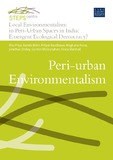Local Environmentalism in Peri-Urban Spaces in India: Emergent Ecological Democracy?
| dc.contributor.author | Priya, Ritu | |
| dc.contributor.author | Bisht, Ramila | |
| dc.contributor.author | Randhawa, Pritpal | |
| dc.contributor.author | Arora, Meghana | |
| dc.contributor.author | Dolley, Jonathan | |
| dc.contributor.author | McGranahan, Gordon | |
| dc.contributor.author | Marshall, Fiona | |
| dc.coverage.spatial | India | en |
| dc.date.accessioned | 2017-07-06T10:44:17Z | |
| dc.date.available | 2017-07-06T10:44:17Z | |
| dc.date.issued | 2017-07-04 | |
| dc.identifier.citation | Priya, R., Bisht, R., Randhawa, P., Arora, M., Dolley, J., McGranahan, G. and Marshall, F. (2017) Local Environmentalism in Peri-Urban Spaces in India: Emergent Ecological Democracy? STEPS Working Paper 96, Brighton: STEPS Centre | en |
| dc.identifier.isbn | 978-1-78118-374-8 | |
| dc.identifier.uri | https://opendocs.ids.ac.uk/opendocs/handle/20.500.12413/13042 | |
| dc.description.abstract | This paper explores the potential of a range of peri-urban environmentalisms to come together in support of sustainable urbanisation. The present-day ‘urban,’ along with the dominant planning visions of urbanisation, lack in inclusivity, deliberative democracy, grassroots innovations, and bottom-up processes of knowledge generation. To sustainably transform this scenario, there is a need for the participation of various sections of citizens, who should be seen not just as subjects of planning, but as creators of a planning framework that emerges from both contestations and innovations in everyday living. Our earlier research on a peri-urban village situated between Delhi city and Ghaziabad town suggested that there is little support for continuation of agriculture in such areas, despite its strategic importance for sustainable urban development. Agriculture could contribute to the greening of urban spaces while enhancing the livelihoods of the poor, recycling urban waste and producing perishable food items for the urban populations. However, we found that present-day government schemes, as they unfold–often under the banner of sustainability–tend to exacerbate peri-urban inequalities. Having observed local citizen environmental action in Ghaziabad, we wanted to understand the potential role it could play in dealing with the environmental crises facing the district and region. During the course of our research we came across a distinctive peri-urban civil society activism, which cannot be viewed in binaries and reflects a pluralist spectrum that allows for alliance building. This environmentalism in Ghaziabad is distinct from the ‘environmentalism of the poor’ practiced by rural and forest dwelling groups; from the dominant elite urban ‘green development’ practices and discourses of ‘bourgeois environmentalism’; and from the urban politics of the poor. It reflects the possibility of creating bridges across sectional interests–rural and urban, red and green ideological streams– and across classes. | en |
| dc.description.sponsorship | ESRC | en |
| dc.description.sponsorship | Ecosystem Services and Poverty Alleviation (ESPA) Programme | en |
| dc.language.iso | en | en |
| dc.publisher | ESRC STEPS Centre | en |
| dc.relation.ispartofseries | STEPS Working Papers;96 | |
| dc.rights | STEPS Centre publications are published under a Creative Commons Attribution – Non-Commercial – No Derivative Works 3.0 UK: England & Wales Licence (http://creativecommons.org/licenses/by-ncnd/3.0/legalcode) Attribution: You must attribute the work in the manner specified by the author or licensor. Non-commercial: You may not use this work for commercial purposes. No Derivative Works: You may not alter, transfer, or build on this work. Users are welcome to copy, distribute, display, translate or perform this work without written permission subject to the conditions set out in the Creative Commons licence. For any reuse or distribution, you must make clear to others the licence terms of this work. If you use the work, we ask that you reference the STEPS Centre website (www.steps-centre.org) and send a copy of the work or a link to its use online to the following address for our archive: STEPS Centre, University of Sussex, Brighton BN1 9RE, UK (steps-centre@ids.ac.uk). | en |
| dc.rights.uri | http://creativecommons.org/licenses/by-nc-nd/3.0/ | en |
| dc.subject | Agriculture | en |
| dc.subject | Environment | en |
| dc.subject | Politics and Power | en |
| dc.subject | Urban Development | en |
| dc.title | Local Environmentalism in Peri-Urban Spaces in India: Emergent Ecological Democracy? | en |
| dc.type | Series paper (non-IDS) | en |
| dc.rights.holder | ESRC STEPS Centre | en |
| dcterms.dateAccepted | 2017 | |
| rioxxterms.funder | Default funder | en |
| rioxxterms.funder | Default funder | en |
| rioxxterms.identifier.project | STEPS Centre | en |
| rioxxterms.identifier.project | 'Risks and Responses to Urban Futures' (NE/L001292/1) Project | en |
| rioxxterms.version | VoR | en |
| rioxxterms.funder.project | 7360ec74-14f4-4420-af2a-8ca314d07ffe | en |
| rioxxterms.funder.project | cc269cd5-926b-43ea-81f1-0bf4532fe113 | en |
Files in this item
This item appears in the following Collection(s)
-
ESRC STEPS Centre [225]
Except where otherwise noted, this item's license is described as STEPS Centre publications are published under a Creative Commons Attribution – Non-Commercial – No Derivative Works 3.0 UK: England & Wales Licence (http://creativecommons.org/licenses/by-ncnd/3.0/legalcode)
Attribution: You must attribute the work in the manner specified by the author or licensor.
Non-commercial: You may not use this work for commercial purposes.
No Derivative Works: You may not alter, transfer, or build on this work.
Users are welcome to copy, distribute, display, translate or perform this work without written permission subject to the conditions set out in the Creative Commons licence. For any reuse or distribution, you must make clear to others the licence terms of this work. If you use the work, we ask that you reference the STEPS Centre website (www.steps-centre.org) and send a copy of the work or a link to its use online to the following address for our archive: STEPS Centre, University of Sussex, Brighton BN1 9RE, UK (steps-centre@ids.ac.uk).


